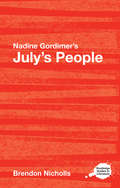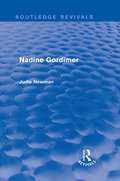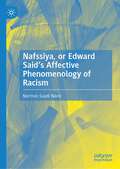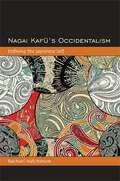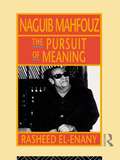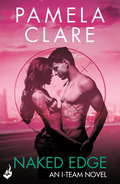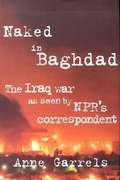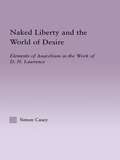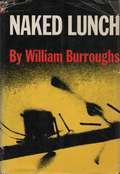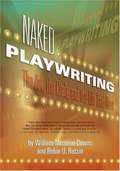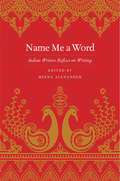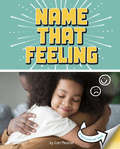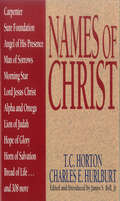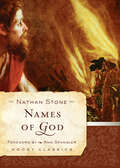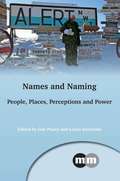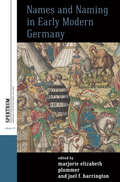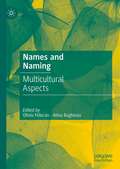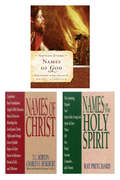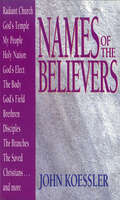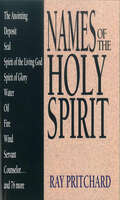- Table View
- List View
Nadine Gordimer's July's People: A Routledge Study Guide (Routledge Guides to Literature)
by Brendon NichollsNadine Gordimer is one of the most important writers to emerge in the twentieth century. Her anti-Apartheid novel July's People (1981) is a powerful example of resistance writing and continues even now to unsettle easy assumptions about issues of power, race, gender and identity. This guide to Gordimer's compelling novel offers: an accessible introduction to the text and contexts of July's People a critical history, surveying the many interpretations of the text from publication to the present a selection of new and reprinted critical essays on July's People, providing a range of perspectives on the novel and extending the coverage of key approaches identified in the critical survey cross-references between sections of the guide, in order to suggest links between texts, contexts and criticism suggestions for further reading. Part of the Routledge Guides to Literature series, this volume is essential reading for all those beginning detailed study of July's People and seeking not only a guide to the novel, but a way through the wealth of contextual and critical material that surrounds Gordimer's text.
Nadine Gordimer: A Casebook (Routledge Revivals)
by Judie NewmanInternational in her appeal, Nadine Gordimer is an original and accomplished novelist whose works have found literary and popular recognition. In this critical study, first published in 1988 and the first by a woman, Judie Newman discusses Gordimer’s novels, including A Sport of Nature. Gordimer’s writing is both political committed and formally innovative, confronting subject matter of great contemporary interest and at the same time seeking out narrative forms that combine European and indigenous culture. Her novels are sensitive to their context, while also offering an important contribution to postmodernist reassessments of narrative poetics, and a challenge to European conceptions of the novel. Judie Newman places particular emphasis on Gordimer’s searching investigation of the relation of gender to genre, and explores other major concerns such as the crisis of liberal values, the nature of historical consciousness, racism, sexual politics, and the psychopathology of power. Her study combines close literary analysis with a wide-ranging exploration of ideas, showing clearly how the artist can contribute to contemporary debate.
Nafssiya, or Edward Said's Affective Phenomenology of Racism
by Norman Saadi NikroThis book adapts the Arabic term nafsiyya to trace the phenomenological contours of Edward Said’s analysis of the affective dimensions of colonial and imperial racism. Reflecting on what he called his “colonial education,” Said rendered his Palestinian/Arab background and experience of racism an enabling component of his academic work. The argument focuses on his “personal dimension” section in his introduction to his famous volume Orientalism, discussing key notions of Said’s oeuvre—such as ‘elaboration,’ ‘circumstance,’ ‘humanism,’ ‘worldliness,’ ‘inventory,’ and ‘critical consciousness.’ Providing a lengthy study of his earlier and somewhat neglected Beginnings: Intention and Method, the book discusses the significance of the style of the essay as a key component of what the author calls Said’s interventionist brand of scholarship. The final chapter outlines how Said’s oeuvre can be situated in a genealogy of a radical phenomenology of racism that emerged from the colonies.
Nagai Kafū's Occidentalism: Defining the Japanese Self
by Rachael HutchinsonNagai Kafū (1879–1959) spent more time abroad than any other writer of his generation, firing the Japanese imagination with his visions of America and France. Applying the theoretical framework of Occidentalism to Japanese literature, Rachael Hutchinson explores Kafū's construction of the Western Other, an integral part of his critique of Meiji civilization. Through contrast with the Western Other, Kafū was able to solve the dilemma that so plagued Japanese intellectuals—how to modernize and yet retain an authentic Japanese identity in the modern world. Kafū's flexible positioning of imagined spaces like the "West" and the "Orient" ultimately led him to a definition of the Japanese Self. Hutchinson analyzes the wide range of Kafū's work, particularly those novels and stories reflecting Kafū's time in the West and the return to Japan, most unknown to Western readers and a number unavailable in English, along with his better-known depictions of Edo's demimonde. Kafū's place in Japan's intellectual history and his influence on other writers are also discussed.
Naguib Mahfouz: The Pursuit of Meaning (Arabic Thought and Culture)
by Rasheed El-EnanyFirst Published in 2004. Routledge is an imprint of Taylor & Francis, an informa company.
Naked Edge: I-Team 4 (I-Team #4)
by Pamela ClareFans of Suzanne Brockmann, Maya Banks, Christy Reece, Julie Ann Walker and Cindy Gerard will adore Pamela Clare's expertly plotted romantic suspense series, which sets the pages alight with sizzling chemistry. For tension, thrills, romance and passion take a spin with the I-Team.The day Navajo journalist Katherine James met Gabriel Rossiter, the earth literally moved beneath her feet when he saved her from a rockslide. So she is crushed when she recognizes her rescuer among the law enforcement officers throwing her and her friends off Mesa Butte, land they consider sacred. Gabe swore he would never again lose himself to a woman. But the attraction he feels to Kat is undeniable. And, appalled by his orders, he's determined to get to the bottom of events at Mesa Butte. But asking questions can be dangerous - almost as dangerous as risking one's heart. Soon Kat and Gabe's passion for the truth - and each other - makes them targets for those who would do anything, even kill, to keep Native Americans off their sacred land...Sexy. Thrilling. Unputdownable. Take a wildly romantic ride with Pamela Clare's I-Team: Extreme Exposure, Hard Evidence, Unlawful Contact, Naked Edge, Breaking Point, Striking Distance.
Naked In Baghdad
by Anne GarrelsAs National Public Radio's senior foreign correspondent, Anne Garrels has covered conflicts in Chechnya, Bosnia, Kosovo, Afghanistan, and elsewhere. She is renowned for direct, down-to-earth, insightful reportage, and for her independent take on what she sees. One of only sixteen non-embedded American journalists who stayed in Baghdad's now-legendary Palestine Hotel throughout the American invasion of Iraq, she was at the very center of the storm. Naked in Baghdad gives us the sights, sounds, and smells of our latest war with unparalleled vividness and immediacy. Garrels's narrative starts with several trips she made to Baghdad before the war, beginning in October 2002. At its heart is her evolving relationship with her Iraqi driver/minder, Amer, who becomes her friend and confidant, often serving as her eyes and ears among the populace and taking her where no other reporter was able to penetrate. Amer's own strong reactions and personal dilemma provide a trenchant counterpoint to daily events. The story is also punctuated by e-mail bulletins sent by Garrels's husband, Vint Lawrence, to their friends around the world, giving a private view of the rough-and-tumble, often dangerous life of a foreign correspondent, along with some much-needed comic relief.
Naked Liberty and the World of Desire: Elements of Anarchism in the Work of D.H. Lawrence (Studies in Major Literary Authors #20)
by Simon CaseyIn this new and original study, Simon Casey explores the long-neglected link between D. H. Lawrence and philosophical anarchism. Focusing on the writings of some of the major anarchists-with particular emphasis on Stirner, Godwin, Bakunin and Thoreau-this book argues that the conceptual parallels between Lawrence and anarchism are strong and extensive and that reading Lawrence within the context of this tradition significantly enhances any understanding of his work. Lawrence's faith in the essential decency of human nature, his forceful defense of individual liberty, and his intolerance of all forms of domination and control all reflect the essential features of anarchism. Naked Liberty and the World of Desire looks at where these attitudes find explicit articulation in Lawrence's essays, poems, and letters, and shows how they are illustrated in his major works of fiction.
Naked Lunch
by William S. BurroughsDelirious, nonlinear ravings of a junkie in hell. Also includes excerpts from the Boston trial where it was declared not obscene in 1966.
Naked Playwriting: The Art, the Craft, and the Life Laid Bare
by William Missouri Downs Robin U. RussinOffers a playwriting course, from developing a theme through plotting and structuring a play, developing characters, creating dialog, formatting the script, and applying methods that aid the actual writing and rewriting processes. This book also provides guidance on marketing and submitting play scripts for both contests and production.
Name Me a Word: Indian Writers Reflect on Writing
by Meena AlexanderA wide-ranging anthology of twentieth-century and contemporary writing from India and the Indian diaspora, curated by a distinguished scholar and poet Internationally renowned scholar, poet, and essayist Meena Alexander brings together leading twentieth- and twenty-first-century voices from India and the diaspora in this anthology. Contributors include English-language luminaries such as R. K. Narayan, Salman Rushdie, and Arundhati Roy and powerful writers in Indian languages such as U. R. Ananthamurthy, Mahasweta Devi, and Lalithambika Antherjanam. This book will make a thoughtful gift for poetry and fiction enthusiasts and fans of Indian literature, as well as an ideal volume for academics introducing writers from the subcontinent.
Name that Feeling: A Turn-and-See Book (What's Next?)
by Cari MeisterLightning flashes. Thunder rumbles. It’s a big storm! How do you think Micah feels? Woof! Woof! Gemma’s grandma brought her a puppy. How do you think Gemma feels? Turn the page to find out which feeling matches the description. Would you feel the same way?
Names Of Christ (Names of... Series)
by Charles E. Hurlburt T. C. HortonLily of the Valley. Bright and Morning Star. Rose of Sharon. Author of the Faith. The Lord Jehovah. Friend of Sinners. Son of Man. King of Kings.What does Christ mean to you? When you consider His person, His work, and His words, are you struck by the depth and complexity, the richness and incalculable beauty of who He is? This classic study, revised for today's reader, examines the many names of Christ, more than 300 in all, each revealing an intimate portrait of the Savior. In this new edition, devotional prayers accompany each name, helping you meditate on the character and person of Jesus Christ. This book is an invaluable resource to any library and is sure to enrich your personal devotional time. Names of Christ follows Names of God in a classic trilogy designed to help contemporary Christians better understand the glory, majesty, and power of the triune God.
Names Of Christ (Names of... Series)
by Charles E. Hurlburt T. C. HortonLily of the Valley. Bright and Morning Star. Rose of Sharon. Author of the Faith. The Lord Jehovah. Friend of Sinners. Son of Man. King of Kings.What does Christ mean to you? When you consider His person, His work, and His words, are you struck by the depth and complexity, the richness and incalculable beauty of who He is? This classic study, revised for today's reader, examines the many names of Christ, more than 300 in all, each revealing an intimate portrait of the Savior. In this new edition, devotional prayers accompany each name, helping you meditate on the character and person of Jesus Christ. This book is an invaluable resource to any library and is sure to enrich your personal devotional time. Names of Christ follows Names of God in a classic trilogy designed to help contemporary Christians better understand the glory, majesty, and power of the triune God.
Names Of God (Names of... Series)
by Nathan StoneJehovah-tsidkenu, "the Lord our righeousness"; Jehovah-shalom, "the Lord our peace"; Jehovah-jireh, "the Lord will provide."This is a study of the twelve most common Hebrew names for God-and their significance and fulfillment in Christ. God's names reveal not only different dimensions of His character but also point to their fulfillment in the Person and work of Jesus Christ. This classic study examines the Old Testament names of God and the particular aspect of His character and dealings with man that each reveals. Names of God is a book that will help contemporary Christians better understand the glory, majesty, and power of God. (More than 115,000 in print)
Names Of God (Names of... Series)
by Nathan StoneJehovah-tsidkenu, "the Lord our righeousness"; Jehovah-shalom, "the Lord our peace"; Jehovah-jireh, "the Lord will provide."This is a study of the twelve most common Hebrew names for God-and their significance and fulfillment in Christ. God's names reveal not only different dimensions of His character but also point to their fulfillment in the Person and work of Jesus Christ. This classic study examines the Old Testament names of God and the particular aspect of His character and dealings with man that each reveals. Names of God is a book that will help contemporary Christians better understand the glory, majesty, and power of God. (More than 115,000 in print)
Names and Naming
by Guy Puzey Laura KostanskiThis book explores international trends in naming and contributes to the growing field of onomastic enquiry. Naming practices are viewed here through a critical lens, demonstrating a high level of political and social engagement in relation to how we name people and places. The contributors to this publication examine why names are not only symbols of a person or place, but also manifestations of cultural, linguistic and social heritage in their own right. Presenting analyses of geographically and culturally diverse perspectives and case studies, the book investigates how names can represent deeper kinds of identity, act as objects of attachment and dependence, and reflect community mores and social customs while functioning as powerful mechanisms of inclusion and exclusion. The book will be of interest to researchers in onomastics, sociology, human geography, linguistics and history.
Names and Naming in Early Modern Germany (Spektrum: Publications of the German Studies Association #20)
by Joel F. Harrington Marjorie Elizabeth PlummerThroughout the many political and social upheavals of the early modern era, names were words to conjure by, articulating significant historical trends and helping individuals and societies make sense of often dramatic periods of change. Centered on onomastics—the study of names—in the German-speaking lands, this volume, gathering leading scholars across multiple disciplines, explores the dynamics and impact of naming (and renaming) processes in a variety of contexts—social, artistic, literary, theological, and scientific—in order to enhance our understanding of individual and collective experiences.
Names and Naming: Multicultural Aspects
by Oliviu Felecan Alina BugheșiuThis edited book examines names and naming policies, trends and practices in a variety of multicultural contexts across America, Europe, Africa and Asia. In the first part of the book, the authors take theoretical and practical approaches to the study of names and naming in these settings, exploring legal, societal, political and other factors. In the second part of the book, the authors explore ways in which names mirror and contribute to the construction of identity in areas defined by multiculturalism. The book takes an interdisciplinary approach to onomastics, and it will be of interest to scholars working across a number of fields, including linguistics, sociology, anthropology, politics, geography, history, religion and cultural studies.
Names of God/Names of Christ/Names of the Holy Spirit Set
by Nathan Stone T.C. Horton Charles E. Hurlburt Ray PritchardThis complete, three-volume set includes Names of God, Names of Christ, and Names of Holy Spirit.In Names of God, Nathan J. Stone writes, &“Indeed we cannot say all that the mysterious word God means to us until we know more about Him.&” God&’s many names reveal not only different dimensions of His character but also point to their fulfillment in the Person and work of Jesus Christ. This insightful little book accurately and clearly works through the many names of God throughout the Old Testament. We can now see God in new lights and angles as we learn of His justice, His unbounded love, His preeminence, and His character--all through His names. In Names of Christ, more than 300 names of Christ are examined in all, each revealing an intimate portrait of the Savior. In this new edition, devotional prayers accompany each name, helping you meditate on the character and person of Jesus Christ. This book is an invaluable resource to any library and is sure to enrich your personal devotional time. In Names of the Holy Spirit, the author examines the Holy Spirit's ministry throughout Scripture as revealed in the names the Bible gives Him. Knowledge of Him will help you understand:His power His indwelling His anointing His intercession His gifts Fruit produced in believers
Names of God/Names of Christ/Names of the Holy Spirit Set
by Nathan Stone T.C. Horton Charles E. Hurlburt Ray PritchardThis complete, three-volume set includes Names of God, Names of Christ, and Names of Holy Spirit.In Names of God, Nathan J. Stone writes, &“Indeed we cannot say all that the mysterious word God means to us until we know more about Him.&” God&’s many names reveal not only different dimensions of His character but also point to their fulfillment in the Person and work of Jesus Christ. This insightful little book accurately and clearly works through the many names of God throughout the Old Testament. We can now see God in new lights and angles as we learn of His justice, His unbounded love, His preeminence, and His character--all through His names. In Names of Christ, more than 300 names of Christ are examined in all, each revealing an intimate portrait of the Savior. In this new edition, devotional prayers accompany each name, helping you meditate on the character and person of Jesus Christ. This book is an invaluable resource to any library and is sure to enrich your personal devotional time. In Names of the Holy Spirit, the author examines the Holy Spirit's ministry throughout Scripture as revealed in the names the Bible gives Him. Knowledge of Him will help you understand:His power His indwelling His anointing His intercession His gifts Fruit produced in believers
Names of the Believers (Names of... Series)
by John KoesslerWhat's in a name?In our culture, parents often select names for their children that are popular or have a nice ring to them. But our heavenly Father bestows on His children names that carry far more meaning and significance. In fact, the Bible reveals many labels believers have that indicate calling, position, and giftedness in Christ.In this devotional study, Dr. John Koessler shows that the names Christ gives to His followers contain more importance and richness than we often realize. Written in a fresh and compelling style, Names of the Believers will encourage and inspire Christians to live up to the names God Himself has given them.Names of the Believers follows the Names of God, Names of Christ, and Names of the Holy Spirit trilogy designed to help Christians better understand the glory, majesty, and power of the triune God.
Names of the Believers (Names of... Series)
by John KoesslerWhat's in a name?In our culture, parents often select names for their children that are popular or have a nice ring to them. But our heavenly Father bestows on His children names that carry far more meaning and significance. In fact, the Bible reveals many labels believers have that indicate calling, position, and giftedness in Christ.In this devotional study, Dr. John Koessler shows that the names Christ gives to His followers contain more importance and richness than we often realize. Written in a fresh and compelling style, Names of the Believers will encourage and inspire Christians to live up to the names God Himself has given them.Names of the Believers follows the Names of God, Names of Christ, and Names of the Holy Spirit trilogy designed to help Christians better understand the glory, majesty, and power of the triune God.
Names of the Holy Spirit (Names of... Series)
by Ray PritchardSpirit of Truth. Dove. Spirit of Holiness. Eyes of the LordHow much do you know about the person and works of the Holy Spirit? To many Christians, the third member of the Trinity is a mystery.This devotional study of the Holy Spirit looks at His ministry throughout Scripture as revealed in the names the Bible gives Him. Knowledge of Him will help you understand:-His power -His intercession-His indwelling -His gifts-His anointing -Fruit produced in believersNames of the Holy Spirit follows Names of Christ in a trilogy designed to help Christians better understand the glory, majesty, and power of the triune God.
Names of the Holy Spirit (Names of... Series)
by Ray PritchardSpirit of Truth. Dove. Spirit of Holiness. Eyes of the LordHow much do you know about the person and works of the Holy Spirit? To many Christians, the third member of the Trinity is a mystery.This devotional study of the Holy Spirit looks at His ministry throughout Scripture as revealed in the names the Bible gives Him. Knowledge of Him will help you understand:-His power -His intercession-His indwelling -His gifts-His anointing -Fruit produced in believersNames of the Holy Spirit follows Names of Christ in a trilogy designed to help Christians better understand the glory, majesty, and power of the triune God.
